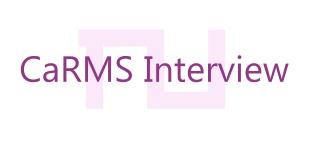
Historically, across all business and industry domains, the interview has been used to select applicants for jobs, iwth candidates usually having been invited for interviews on the basis of an application form or CV.
The interview extends to the employers the opportunity to see potential employees in person and decide if they wish to add them to their teams. The interview does as well, provide for opportunities to test the applicants' competencies and motivation in a structured environment, thereby attempting to provide a level playing field o which the best applicants can shine.
Medical interviews are no different in this respect, and the aim is to select the best candidate for the Medical Residency Training position.
There may be factors other than performance at the CaRMS interview that impact on whether a candidate is successful. Some candidates will have an advantage based on their past experience and performance in medical examinations and assessments, which can add to the overall strength of a candidate's application.
It is also possible that candidates will have gained an advantage prior to interview through previous contact with members of the selection committees or the Program Directors themselves. Occasionally, an interviewer has witnessed a candidate's performance first-hand in the heathcare workplace. In other instances, a trusted colleague may have recommended a candidate to a panel member. Sometimes, candidates have made the effort to meet with panel members for the first time prior to interview, but this is frequently not possible.
However, do not fall into the trap of thinking that the outcome of an interview is predetermined. This is infrequently the case, and this strategy is used by unsuccessful applicants as an easy excuse to explain their unsuccessful performance.
There can be no doubt that interview is the most crucial component of candidate selection. The interview process, in whatever shape or form it takes, is labour-intensive for those who are organizing and running it. Medical graduates who have made it to that stage will be similar calibre, and performance at interview may be the only way to distinguish between them.
In terms of what the interviewer expect from a candidate, can be summed up to a collection of personal biases of people comprising the interview panels, and naturally there may be individual preferences according to personalities and styles. You may be surprised to know that there is usually broad agreement among interview panel members when it comes to selection. In other words, the best candidate is usually obvious. Your goal would focus on convincing the panel that you are that best candidate. The key to achieving this is through disciplined preparation!
